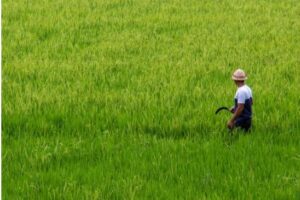
In the face of the pandemic caused by the Covid-19 virus — or more accurately, by the negligence of human beings in their stewardship of the resources of the planet — we have all discovered that there is very little we can truly rely upon, especially the due diligence and judgment of our political leaders. Although, apparently, the kindness of strangers is still operative, at least to some degree. One thing we can rely upon is the venality of human nature, in taking advantage, even of a crisis of this magnitude, to pile up ever more wealth and try to accumulate ever more power. This reflects a stubborn unwillingness to hear the message of the virus, echoing that of the Book of Ecclesiastes: “Vanity of vanities; all is vanity.” All human behavior, in self-striving against the flow of reality, is in vain.
In Zen, even the activity of pursuing insight through meditation may be in vain, owing to an inept practice, or a lack thereof; and/or a fundamental misunderstanding. As the Ch’an poem “Trust in Mind (Hsinhsinming)” reminds us:
Now there are sudden and gradual in which teachings and approaches arise
Whether teachings and approaches are mastered or not reality constantly flows
We can get caught up in the appearance of the teaching, and miss what it is pointing to. But generally, the practice of zazen is not considered to be in vain. Indeed, it is the essential behavior that may save us from our own vanity, and particularly from the pursuit of vain ambitions, including worldly wealth and power. As Master Dogen reminds us in his interpretation of an earlier Chinese poem, “Acupuncture Needle of Zazen (Zazenshin),” translated by Shohaku Okumura Roshi, one of my formal teachers, this practice has been central to all Buddhas and the Ancestors of Zen, whose lives can hardly be considered to have been in vain:
The essential-function of buddhas
and the functioning-essence of ancestors
being actualized within non-thinking
being manifested within non-interacting
Being actualized within non-thinking
the actualization is by nature intimate
Being manifested within non-interacting
the manifestation is itself verification
The actualization that is by nature intimate
never has defilement
The manifestation that is by nature verification
never has distinction between Absolute and Relative
The Intimacy without defilement
is dropping off without relying on anything
Verification beyond distinction between Absolute and Relative
is making effort without aiming at it
The water is clear to the earth — a fish is swimming like a fish
The sky is vast and extends to the heavens — a bird is flying like a bird
Brief enough that it can be quoted in its entirety here, the poem is a variation on an earlier version that Master Dogen apparently came across on his sojourn to China in his mid-twenties. With unparalleled succinctness, this poem in its unique, unfolding form reinforces the functional legacy of the lineage, sums up the difference between its actualization in practice (of non-thinking zazen) and its manifestation in our life (of non-interacting consciousness), and makes the point that this direct experience is all the verification we could hope for, all the verification that we need. And that it is clearly manifest in the life of Nature — e.g. swimming fish and flying birds — all around us, for those whose “eye of practice” (from “Self-fulfilling Samadhi, Jijuyu Zammai) can reach it.
What we are left with is the realistic — not overly pessimistic nor optimistic — attitude adjustment of “dropping off without relying on anything…”
Zenkai Taiun Elliston Roshi
But I want to focus mainly on the one line, “The intimacy without defilement is dropping off without relying on anything.” I think it particularly appropriate to our practice during this time of social crisis.
Those institutions to which we turn in times of crisis for maintaining our sanity, or for succor and salvation — namely the reassurances of religion in the face of the predations of nature, and the promise of science and technology to confront and overcome chaos — prove unreliable, woefully inadequate actually, in meeting the scale and speed of the present clear danger, especially when commingled with the third force of political ideology, with its short-sighted insistence on corporate economic gain over individual health and safety. Thus the pandemic becomes the messenger of doom, when its manifestation was all too predictable.
The thrust of a manuscript currently in editing phase places Zen at the center of the spectrum of societal activities, with those of Theism, or religion, at one extreme, and those of Rationalism, or science, at the other, outlined in a chart of eight dimensions of each:
DIMENSIONS RATIONALISM THEISM ZEN
- Questions asked: How? Why? What?
- Problems defined: Chaos Sin Ignorance
- Attitudes nurtured: Perseverance Faith Doubt
- Entities trusted: Evidence Savior Self-Nature
- Methods used: Experiment Prayer Meditation
- Truths claimed: Verification Belief Identification
- Goals pursued: Knowledge Salvation Vow
- Conclusions drawn: Evolution Creation Co-arising
The main point in including the chart here is to illustrate that those beliefs of theism, versus the findings of science that we usually turn to in times of crisis, are failing us. In large part this is because most people are confused between the two, vacillating back and forth with short-term goals that are intended to maintain or re-establish the status quo, while confronting the stubborn nature of the viral contagion, exacerbated by the self-centered striving of human nature. These are “known issues” in Zen, and human intervention based on a toxic mix of religious belief and pseudo-science, conspiracy and superstition, only adds to the confusion and chaos. Bad actors on all fronts continuing their mindless compulsions, such as cops killing black folks, only add another circle of hell to today’s Dante’s inferno. This is what is meant by “hell” in Zen — we create it. The implication is that, by making other choices — changing our behavior — we might be able to create heaven on Earth.
Note that the Question leads scientists to ask How they might fix the problem of the pandemic, by pursuing immediate and long-term solutions through the Method of Experimentation, which unfortunately takes time to develop actionable Evidence, time we do not have to spare. Asking Why is a Theist’s attempt to rationalize the unspeakable tragedy of massive human suffering in the framework of a loving Creator, through Prayer directed to a hopeful Savior, but all to easily turned to a blame game between competing factions. The Zen person asks What can be done, turning to Meditation to find workable answers in our original Self-Nature, which is the real-world meaning of “trust in Mind.”
Note also that where the Rationalist might define the Problem as a manifestation of Chaos, including that engendered in the minds and behaviors of fallible human beings, the Theist might interpret the emergence of the virus and the ensuing slaughter to the vengeance and punishment of Sin, as seen in the eye of the beholder, of course. The Zen practitioner sees “the whole catastrophe” (Zorba the Greek) as yet another manifestation of Ignorance, both of a primordial, innocent sort — of simply not knowing what we are doing, in its full measure of karmic consequence — in this case the careless slaughtering and consumption of other sentient beings; but also of the willful sort — that we have been through this before, collectively, and so should have some awareness of the fact that if we continue to pursue the same out-of-balance relationship to Nature, It will continue to rebalance the scales, to our great regret.
So here is the hard part. From a Zen perspective, we cannot comfort ourselves with the smug assurance that a benevolent deity is overseeing everything, not to worry. Nor can we feel absolute confidence that science will somehow save our bacon at the eleventh hour, as in our hopeful, historical revisionism retelling past such calamities, or our fantasy-based world view of daily human life around the planet even in the best of times. Instead, we find ourselves forced to embrace Master Dogen’s prescription of dropping off without relying on anything, the nostrums of religion, and the sci-fi visions of science, included.
What we are left with is the realistic — not overly pessimistic nor optimistic — attitude adjustment of “dropping off without relying on anything,” anything at all, to materially effect the circumstances, Buddhism’s all-encompassing “causes and conditions” of the situation in which we find ourselves. We do not take it as a special message from our Creator, unleashed as tough love for his chosen ones — which we will survive, or if not, find ourselves in Her/His presence in heaven. Nor can we presume that the forces of science will save us from the ignorant activities of our fellow human beings, with the notable lack of altruistic motive working the levers of power. Though some would beg to differ, we cannot even rely upon our method of meditation to have any direct effect on this or any other circumstance. If we see zazen as an escape, we are hopelessly trapped. Zen embraces suffering wholeheartedly.








